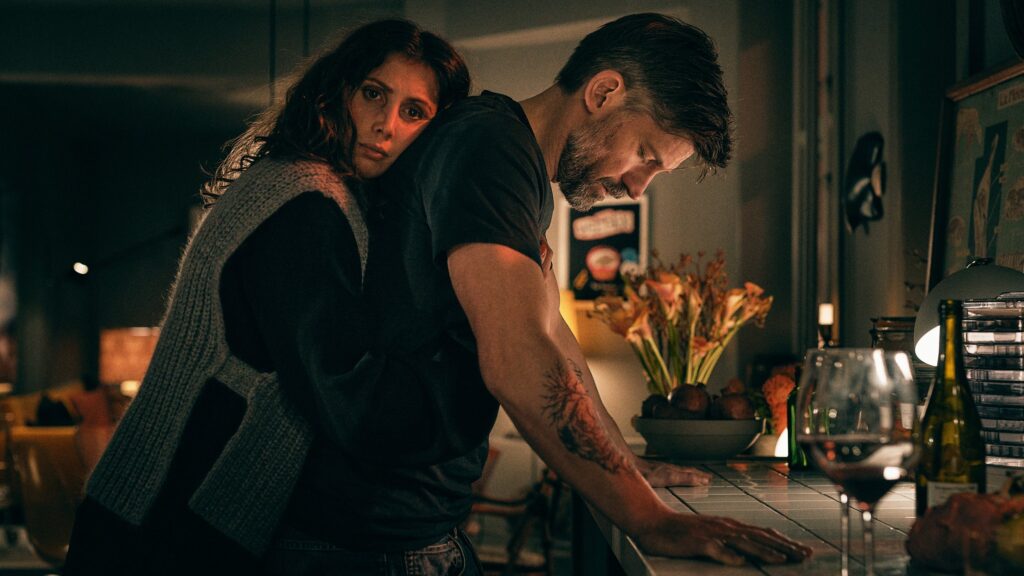March 5, 2022
by Carla Hay

Directed by Christoffer Boe (also known as Mr. Boe)
Danish with subtitles
Culture Representation: Taking place in Copenhagen, Demark, the dramatic film “A Taste of Hunger” features an all-white cast representing the working-class and middle-class.
Culture Clash: A husband and a wife, who own a successful upscale restaurant, have their marriage put at risk when someone anonymously sends a note revealing the wife’s extramarital affair.
Culture Audience: “A Taste of Hunger” will appeal primarily to people who are interested in watching relationship dramas that have mystery and intrigue.

Even though “A Taste of Hunger” centers on a couple who own a restaurant together, the movie is really about what people will do to achieve their definition of success, and how ambition can turn into an unquenchable obsession. It’s a well-acted and thoughtfully written story with plenty of suspense and mystery over who is trying to ruin the marriage of the movie’s central couple. “A Taste of Hunger” shows in nuanced ways how a type-written note is really a symptom, not the catalyst, of this couple’s problems.
Christoffer Boe (also known as Mr. Boe) directed “A Taste of Hunger” and co-wrote the movie’s screenplay with Tobias Lindholm. The movie takes place in Copenhagen, Denmark, and doesn’t waste time showing that someone wants to expose infidelity in the marriage of successful restaurateurs Maggie (played by Katrine Greis-Rosenthal) and Carsten (played by Nikolaj Coster-Waldau), who co-own a sleek, upscale restaurant called Malus. Maggie is the restaurant manager, while Carsten is the executive chef.
The movie opens by showing Maggie and Carsten in a seemingly happy and passionate marriage. One evening, while the restaurant is closed, they discuss an elaborate decoration that they plan to put display at one of the restaurant tables that’s meant to be showstopper at the center of the restaurant. Later, Maggie and Carsten meet up at a bar. She tells him seductively, “I really crave dick when I’ve had whiskey sour.” Viewers later find out that this comment about whiskey sour is a foreplay joke for the couple, and it’s a comment that’s mentioned more than once throughout the movie.
While on this date, Maggie and Carsten are in their car, and they have an amorous moment where she’s about to give him oral sex. But then, they get a call from a restaurant employee that there’s a man dining by himself who could be a Michelin reviewer, based on his actions during this meal. There’s been a rumor going around the Copenhagen restaurant scene that a reviewer for the prestigious Michelin Guide has recently been dining at restaurants in the city.
Michelin reviewers, whose identities are supposed to be a secret, tend to dine alone and pay in cash, so Maggie and Carsten assume that this customer is probably a Michelin reviewer. By the time they get to the restaurant, the diner has left. All the information that Maggie and Carsten have is a vague description of what he looks like. And even then, it’s not absolute proof that he’s a Michelin reviewer.
Just like many restaurateurs, Maggie and Carsten dream of having a restaurant that gets a Michelin star. Getting one Michelin star is considered a worthy accomplishment. Getting two Michelin stars makes a restaurant even more prestigious. Getting three Michelin stars (the highest rating) is the ultimate endorsement that’s reserved for restaurants that are considered the best of the best. Over the course of the movie, Maggie and Carsten’s ambition to get a Michelin star affects their actions in how they handle their business and their personal lives.
While Maggie and Carsten seem to be doing well with their restaurant and their marriage, their marriage is actually in trouble. An anonymous person is seen typing something on a computer: “Your wife loves someone else.” One day when Maggie is at the restaurant, she sees a stack of mail with a folded note on top. The note, which address to Carsten, was not sent through a postal service because there’s no envelope, mailing address or stamp for the note. The note was placed there by someone who had access to the restaurant and knew where the mail was kept.
Even though the note is addressed to Carsten, Maggie opens up the folded paper to read the note. And that’s when she sees the words that horrify her: “Your wife loves someone else.” Someone knows about her secret affair and wants to tell Carsten. This threat to expose the affair comes at a bad time because Carsten and Maggie are about to be interviewed for a high-profile article about them and the success of Malus.
In addition, Carsten and Maggie desperately want to get a Michelin star for the restaurant. Maggie knows that an infidelity scandal could ruin the image that they’ve carefully crafted for themselves and the restaurant. And so, for most of the movie, Maggie tries to find out who sent that note before that person can find another way to expose Maggie’s infidelity.
On the surface, this story seems like it could just be enough for a short film. However, “A Taste of Hunger,” which is told in a non-linear way, shows a lot of flashbacks to give background information on how Maggie and Carsten met, fell in love, got married, started a family, and decided to open their own restaurant. The editing of this backstory is done in such an engrossing way that it won’t confuse or bore viewers. The flashbacks (which also reveal the identity of Maggie’s lover) put the present-day situation of Maggie and Carsten in better context so viewers have a better understanding of why the stakes are so high for this couple.
Maggie and Carsten met when she was at a house party, and Carsten was a caterer chef in the kitchen. At the time, Carsten and his older brother Torben (played by Nicolas Bro) co-owned a small catering business, but the two brothers often clashed with other in decision making. For example, at this party, Torben is upset and yelling at Carsten because they agreed to the client’s request to serve sushi with “normal” rice and lots of chili mayonnaise. However, Carsten served something else that was in season.
In order not to upset the client, Torben orders a halt on what was about to be served to the guests, and he decides to go out and buy the necessary ingredients for the menu that the client requested. In the meantime, the party guests are waiting for food to be served. That’s why Maggie goes to the kitchen to see what’s going on and witnesses this angry dispute between Torben and Carsten.
Torben is also angry because he has to buy more food than expected, so the catering company will lose money on this party job. In order to save money, Torben orders Carsten to dismiss the two or three catering assistants who were hired to help at this party. Carsten apologetically tells the assistants that they will get paid for the time that they served, but he says it in a way that’s not very believable.
Maggie is a little inebriated when she first meets Carsten in the kitchen. When she strikes up a somewhat flirtatious conversation with him, there’s an instant mutual attraction. Maggie likes how Carsten seems to be a visionary chef who has his own ideas of what should be on a menu. She’s also a foodie, but she’s more interested in restaurant management than in being a chef.
Maggie knows that the party guests will eventually expect to be served food, so she offers to help. She suggests that drinks should be served in the meantime, so she helps Carsten make some drinks since she has experience as a bartender. They decide to make whiskey sour for the guests. It’s in this scene that viewers find out why whiskey sour has become a playful inside joke for Maggie and Carsten.
Carsten and Maggie quickly bond during this kitchen encounter. He opens up to her about his former mentor, a restaurant chef named Stellan (played by Dag Malmberg), whom Carsten worked with for 10 years until Stellan fired Carsten because Carsten wouldn’t follow Stellan’s orders. However, Carsten still has tremendous respect for Stellan, and he proudly shows Maggie a carving knife that Stellan gave to Carsten as a gift. Maggie sees that Carsten has an independent streak, so she tells Carsten that he’s too good to be a caterer and should be the chef of his own restaurant.
Some parts of Maggie and Carsten’s life are left out of the flashbacks, such as their wedding and the births of their two children. In the present day, Maggie and Carsten’s children are daughter Chloe (played by Flora Augusta), who’s about 7 or 8 years old, and son August (played by August Vinkel), who’s about 4 or 5 years old. Chloe likes to watch her father work in the kitchen and is perceptive and curious. However, August seems to be the favored child in the family. Maggie and Carsten think that August is pretty much close to perfect.
Of course, there came a point when Carsten and Torben agreed to no longer work together, but their brotherly relationship is still solid. Their catering company also went out of business, and Torben moved on to doing something else with his life. Some scenes in the movie show Carsten and Maggie having family get-togethers with Torben and his wife Pia (played by Maj-Britt Mathiesen) and their respective children.
In the present-day, Carsten is shown to be an almost stereotypical hard-driving chef, who will praise the staff when he’s satisfied with their service, but he doesn’t hesitate to belittle and humiliate his employees if he thinks they aren’t meeting his high standards. An early scene in the movie shows Carsten has a nasty temper. He’s yelling at the kitchen staff because a meal was sent back by a customer. Carsten tastes the meal and finds out it has over-fermented lemons. He throws a plate and shouts, “What is this shit?”
Carsten demands to know who’s responsible for over-fermented lemons being served to a customer. An employee named Frank (played by Rasmus Hammerich) sheepishly admits that he didn’t taste the meal before it was sent out to the customer. Carsten immediately fires Frank in front of the rest of the staff. Carsten later informs the staff that a Michelin reviewer could be in the restaurant at any time and that there better not be any more mistakes. “A Taste of Hunger” shows other signs that Carsten has become a workaholic at the expense of his personal relationships.
Meanwhile, the movie throws in some additional drama over a health concern of Maggie’s where she has to gets testing done for this health issue and finds out the results from a doctor. Flashbacks also show Carsten’s interactions with his former mentor Stellan. And when Carsten became a restaurateur, Carsten was a mentor to a sous chef named Frederik (played by Charlie Gustafsson), who’s in his early-to-mid-20s. Frederik no longer works at Malus and is currently working at another restaurant.
“A Taste of Hunger” has a few twists and turns to the story. However, since the movie already establishes from the beginning that whoever left the note has some type of access to the restaurant area where the mail is kept, the list of possible suspects is very short. Still, when it’s revealed who typed the note and delivered it, this person’s identity might be surprising to a lot of viewers.
All of the movie’s cast members give believable performances, but Greis-Rosenthal is the standout because she has to show the most emotional range out of all the characters. It’s because Maggie is the one who has to “keep up appearances” while frantically trying to find out who wrote the note and if that person will do something else to expose the affair—all while feeling pressure over the possibility that Malus is going to be reviewed by Michelin. Maggie shows that she’s willing to go to certain extremes to hide her secrets, so her character is unpredictable, in terms of what she will do next.
There are certain parts of the movie where Maggie tries to find out the identity of the Michelin reviewer. Maggie’s search for the Michelien reviewer is actually one of the few weak aspects of the movie. Michelin reviewers go to great lengths to keep their identities secret and would deny being a reviewer if confronted by an over-eager person who has a vested interest in getting a positive review. Maggie should know this already, but it doesn’t stop her from wasting a lot of time trying to find the reviewer in Copenhagen.
As for Maggie trying to find out who wrote the exposé note about her affair, she immediately suspects that the lover in her extramarital affair is responsible for the note, but this person denies sending the note when Maggie confronts this person. Maggie becomes increasingly agitated and paranoid about finding out who wants to expose the affair. Regardless of who sent the note, Maggie experiences a reckoning where she has to face the harsh reality of why she cheated on Carsten in the first place.
In addition to being a stylish-looking film—the movie’s production design of Malus is gorgeous, as is any scene involving the display of restaurant food—”A Taste of Hunger” offers an insightful dissection and observation of a marriage that looks strong and healthy on the outside but is troubled and crumbling on the inside. On a deeper level, the movie also effectively shows that when people get everything that they think they want in life, it doesn’t always make them happy. Viewers of the movie should watch for the end-credits scene, which gives the story’s conclusion a different tone than what was shown before the end credits.
Magnolia Pictures released “A Taste of Hunger” in select U.S. cinemas, on digital and VOD on January 28, 2022.




